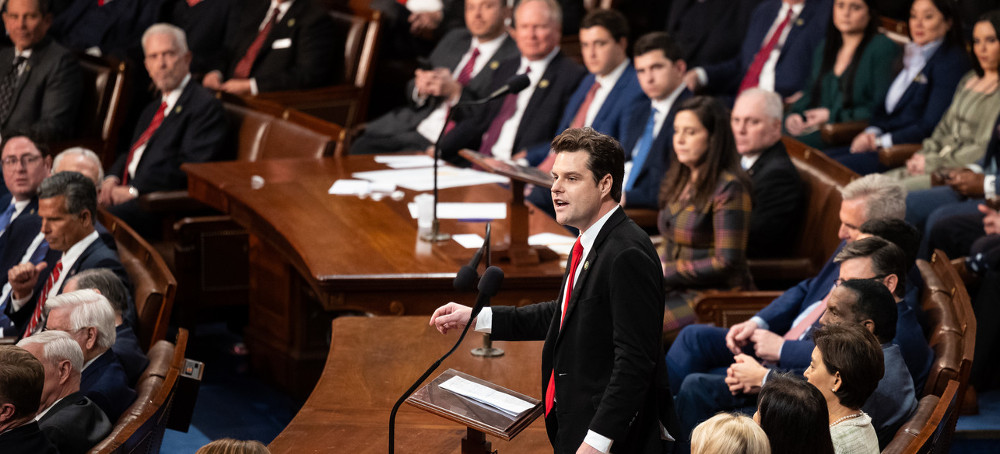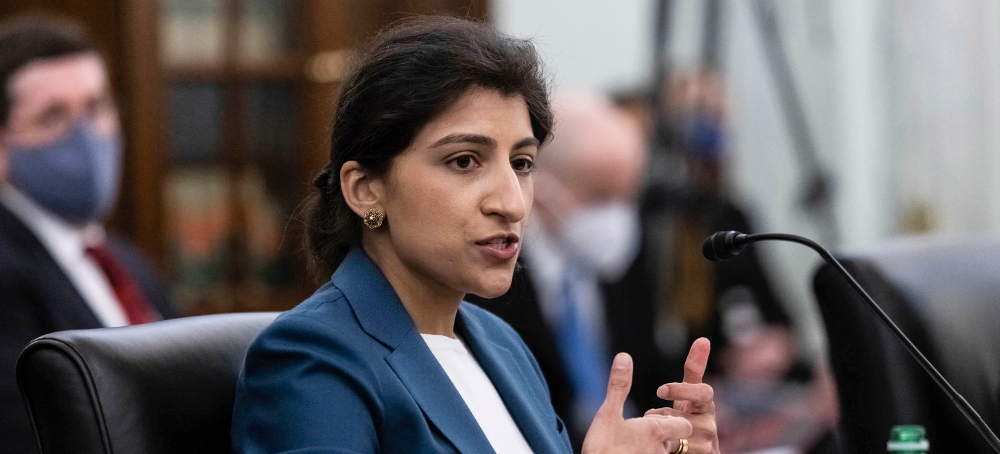Live on the homepage now!
Reader Supported News
Rep. Ralph Norman, a South Carolina Republican, said the debt ceiling fight is a “non-negotiable item.”
“That’s a non-negotiable item,” said Norman, a leader of the squad objecting to McCarthy, a California Republican, becoming speaker of the House.
A reporter asked Norman if he meant default on the debt, as the debt ceiling and a government shutdown are not directly linked. “That’s why you need to be planning now what agencies — what path you’re gonna take now to trim government. Tell the programs you’re going to get to this number. And you do that before chairs are picked,” he said, referring to the process of choosing and installing House committee chairs.
A quirk of parliamentary procedure requires Congress to authorize spending, then appropriate money for those authorized expenditures, and then to authorize the Treasury Department to issue debt in order to pay for that appropriated money. Some constitutional scholars argue that the debt ceiling is unconstitutional, but currently both parties recognize it as a legal and valid restriction on the government’s ability to issue debt.
If the Treasury defaults on its debt, the result could be a global economic crisis, as many companies and foreign governments hold their capital reserves in Treasury notes. If those notes can’t be turned into dollars, payments won’t be made, producing a cascading collapse of counter-parties that had been expecting those payments, and so on. In 2011, the threat of default downgraded the U.S. government’s credit worthiness and led to a major stock market crash, but a deal was struck before the U.S. defaulted.
The debt limit is expected to be hit sometime in the summer. Democrats declined to take the opportunity to eliminate or raise it further during the lame-duck period when they still controlled the House.
Another reporter noted to Norman that House Republicans lack the power to dictate those spending terms to Democratic President Joe Biden’s White House and a Democratic-controlled Senate, a reality Norman conceded. His band of Freedom Caucus members, however, was willing to use what leverage they had.
“You play the cards you’re dealt,” he said. “Biden’s gonna veto anything. Can we get a two-thirds vote [to override]? Probably not. But it is what it is. If we do what the American people tell us to do, which is to get this country back on track financially, we will get their support. The insane spending cannot keep up.”
The Intercept asked Norman if he thought a potential Speaker Jim Jordan, R-Ohio, whom Norman said he trusts more than McCarthy, would be willing to default on the debt. “No, he would cut things that have to be cut,” Norman said. “Default is only if you keep the spending. We’re going to default eventually if we keep going down this path.” (Jordan did not immediately respond to a request for comment.)
Asked what specifically McCarthy had done to lose his trust, Norman said, “The 14 years he’s been here when he’s voted for every spending package and this $1.7 trillion omnibus.”
READ MORE  Rep. Matt Gaetz nominates Rep. Jim Jordan to be speaker of the House at the Capitol on Jan. 3, 2023. (photo: Francis Chung/Politico)
Rep. Matt Gaetz nominates Rep. Jim Jordan to be speaker of the House at the Capitol on Jan. 3, 2023. (photo: Francis Chung/Politico)
While Norman appears to believe that shutting down the government and refusing to lift the debt ceiling are the same thing, they are, in fact, different and unrelated. Shutting down the government happens when Congress fails to authorize funding to keep it open. The debt ceiling is a weird quirk of U.S. law that requires Congress to hold a separate vote to authorize paying its debts after it has already incurred the debt. If Congress votes to spend more money than it raises, then refuses to pay the people who lent it the money to make up the difference, it would devalue the dollar as a global currency and possibly trigger a global financial crisis.
This vote was something of a formality, occasionally used as a prod to get Congress to pass other mutually agreeable provisions, until the Obama administration, when Republicans decided to begin using the debt ceiling as a hostage, threatening to start a crisis unless Obama accepted spending cuts. Obama disastrously misidentified these threats as an invitation to a negotiation (which he desperately wanted), only realizing too late that he was actually being extorted.
Republicans view this episode as a success and their best model for enacting spending cuts. The Republican fiscal agenda is deeply unpopular, and rather than try to enact it when they win power (the method most parties use to enact their agendas), Republicans now see Democratic administrations as the best time to advance it. The strategy is that they can force Democrats to accept unpopular spending cuts, thereby relieving Republicans of the backlash.
And while the most unhinged members of the Republican caucus have the most grandiose designs for using the debt ceiling as extortion, even the least-insane Republicans believe this method should be a routine tool to enact their agenda. The party’s mainstream position, expressed in arguments like this and this, argues that Republicans should use the debt ceiling as extortion. The stance differs from the radical one in degree, not kind — mainstream Republicans want their party to confine itself to attainable demands.
Now whether the debt ceiling should be used as an extortion device is a normative question. Republicans obviously have rational reasons to believe that it should be: It’s a tool that’s useful for parties that have unpopular economic policies to push and a credible reputation for being crazy — two conditions that apply to Republicans but not to Democrats.
Putting aside the question of whether it’s right or wrong, there is a second one of whether the mainstream Republican plan of a small, “reasonable” debt-ceiling extortion is even possible. The events of this week strongly suggest that it is not.
Even under the best of circumstances, these negotiations are inherently fraught. There’s no obvious way for either party to determine just how many schoolchildren should be denied lunches or single mothers stripped of their health insurance in return for the privilege of postponing a self-induced financial crisis. Both parties have a natural incentive to engage in brinkmanship, pushing the negotiations to the last moment. When the parties are negotiating matters like the federal budget, the deadline slips routinely. But a short-lived government shutdown has limited damage. Even a very brief debt-ceiling breach would likely have permanent costs.
In the current circumstances, a successful hostage release would be all but impossible. Imagine a Republican Speaker — any Republican Speaker — figuring out a ransom that almost the entire caucus could agree on. The intraparty dynamics virtually guarantee that anything a Republican leader could agree to would immediately be seen on the far right as too little.
All is to say that even if you think Biden ought to negotiate a debt-ceiling-ransom demand, it’s now a practical impossibility. The only way to accomplish the goal is to separate it from policy altogether. The best way to do that would have been for Democrats to lift the debt ceiling when they still had control of Congress. (Their failure to do so could potentially prove to be the decisively catastrophic choice of the last four years.) The best remaining option is for the Treasury to use its Congressionally inscribed authority to mint coins in denominations it chooses.
(Republicans would meet such a move with a lawsuit, and they can normally count on sympathetic jurists to stretch legal interpretation as far as it can go to achieve party-wide ends. But it seems doubtful that even a Republican-controlled Supreme Court would issue a ruling that would precipitate an immediate economic catastrophe.)
All this may sound implausible and difficult to imagine. But picture trying to sell a bipartisan negotiation to a member of Congress who thinks breaching the debt ceiling and keeping the government open are the same thing or that forest fires were caused by the Rothschilds via a secret space laser.
READ MORE  Olha, a 26-year-old Ukrainian, faced sexual violence by Russian soldiers when she was detained in Kherson. (photo: The New York Times)
Olha, a 26-year-old Ukrainian, faced sexual violence by Russian soldiers when she was detained in Kherson. (photo: The New York Times)
Investigators have uncovered widespread evidence of abuse by Moscow’s forces, including rape and forced nudity. Kremlin officials have repeatedly denied accusations of rights violations.
“It was to frighten,” she remembered. “I did not know what would come next.”
Sitting in Olha’s cramped kitchen weeks later in Kherson, in southern Ukraine, Anna Sosonska, an investigator with the prosecutor general’s office, listened to her recount the ordeal — an account of forced nudity that, prosecutors say, added to an accumulation of evidence that Russian forces had used sexual crimes as a weapon of war in the places they once ruled.
READ MORE  Los Angeles Police Department Officer Jason Goode issues a warning to a motorist on Ventura Boulevard in Encino. (photo: Gary Coronado/Los Angeles Times)
Los Angeles Police Department Officer Jason Goode issues a warning to a motorist on Ventura Boulevard in Encino. (photo: Gary Coronado/Los Angeles Times)
The California Racial and Identity Profiling Advisory Board’s report provides data from 58 California law enforcement agencies, both state and local.
It looked at 3.1 million vehicle and pedestrian stops in 2021 and found that law enforcement agencies stopped and searched Black people 2.2 times as often as white people.
Youth between age 15 to 17 perceived to be Black were six times more likely to be stopped and frisked, compared to youth perceived to be white.
Black youth between the ages of 10 and 17 were detained curbside or in a patrol car, searched, or handcuffed at a higher rate than all other races and age groups.
Officers used force against people perceived as Black at 2.2 times the rate of individuals perceived as white.
For those perceived as Latino, officers used force against them at 1.3 times the rate of individuals perceived as white.
The report is required by a 2015 law known as the Racial Profiling and Identity Act. A growing number of law enforcement agencies is submitting data for the report. In 2020 — when the advisory board released its first report that included information about traffic stops — just eight law enforcement agencies submitted data for the study.
The advisory board wants the data to help shape state and local law enforcement policies.
“California is leading the nation in its effort to collect data on police-citizen interactions and to foster transparency and make progress towards fair, equitable, effective policing,” said Steven Raphael, co-chair of the California Racial and Identity Profiling Advisory Board.
The data comes from information officers must report on upon the conclusion of a traffic stop, such as whether no action was taken after a stop, or if it led to a warning, a citation or an arrest.
The data found that officers reported “no action taken” about 2.2 times more often for people they thought were Black than individuals thought to be white. A “no action taken” report suggests that an individual was not engaging in illegal activity.
Some of the report’s recommendations include raising standards for officers to stop citizens. If a citizen is stopped, the report recommended that agencies ban searches unless officers have probable cause to suspect a crime.
The board also recommended that agencies prohibit law enforcement officers from inquiring about the status of someone’s probation or parole.
Other recommendations included changes to the way officers interact with young people, especially regarding the use of force.
“California remains at the forefront of the nation in examining police stop data,” said California Attorney General Rob Bonta. The advisory board “has continued to issue thoughtful recommendations for how to strengthen public safety and build trust between law enforcement and our communities.”
READ MORE  FTC Chair Lina Khan, a prominent critic of Big Tech, at her confirmation hearing in 2021. (photo: Graeme Jennings/AP)
FTC Chair Lina Khan, a prominent critic of Big Tech, at her confirmation hearing in 2021. (photo: Graeme Jennings/AP)
Noncompetes are "an unfair method of competition" and violate US law, FTC says.
The contract clauses currently "bind about one in five American workers, approximately 30 million people," the FTC said in a fact sheet, writing that noncompetes prevent workers from seeking better jobs and prevent employers "from hiring qualified workers bound by these contracts."
"Noncompetes undermine core economic liberties," FTC Chair Lina Khan wrote. "Evidence suggests noncompetes also suppress earnings and opportunity even for workers who are not subject to a noncompete. FTC economists estimate that noncompetes lower US workers' collective income by $250-$296 billion [per year]."
Khan added that "locking workers in place can enable incumbents to close off markets to new rivals, undermining dynamism and healthy competition."
Employers would have to rescind existing noncompetes
The FTC said its proposed rule "would make it illegal for an employer to enter into or attempt to enter into a noncompete with a worker; maintain a noncompete with a worker; or represent to a worker, under certain circumstances, that the worker is subject to a noncompete."
The FTC said employers would have to "rescind existing noncompetes and actively inform workers that they are no longer in effect." The proposed rule would apply to employees and independent contractors, covering "anyone who works for an employer, whether paid or unpaid," the FTC said.
The FTC defined a noncompete clause as "a contractual term between an employer and a worker that prevents the worker from seeking or accepting employment with a person, or operating a business, after the conclusion of the worker's employment with the employer."
A noncompete ban would affect many types of jobs and industries. "Companies use noncompetes for workers across industries and job levels, from hairstylists and warehouse workers to doctors and business executives," the FTC said. "In many cases, employers use their outsized bargaining power to coerce workers into signing these contracts."
The FTC pointed to a case involving Amazon, which sued former executive Gene Ferrell in 2017, alleging he violated a noncompete agreement when he left to join a tech startup called Smartsheet. "After unfavorable media coverage, Amazon dropped the suit," the FTC said. "Under the leadership of Gene and others, Smartsheet thrived and exceeded $500 million in annual revenue."
Rulemaking could test limits of FTC authority
The proceeding could test the limits of the FTC's rulemaking authority. "This proposed rule sets up [a] potential legal challenge to the scope of FTC authority to issue substantive rules (which SCOTUS has not previously addressed)," wrote Jonathan Adler, a law professor at Case Western Reserve University.
Adler noted that in a 1973 ruling, the US Court of Appeals for the District of Columbia Circuit embraced a "broad view of FTC rulemaking authority." But it is "questionable whether SCOTUS would uphold that precedent," he wrote.
The US Chamber of Commerce said it is considering a lawsuit against the FTC if the noncompete ban is adopted. "We don't believe they have the statutory authority," Sean Heather, the group's senior VP for international regulatory affairs and antitrust, told The Wall Street Journal. "They know they are on very tenuous ground."
The FTC is starting the process of implementing a noncompete ban by releasing a Notice of Proposed Rulemaking. The agency will invite the public to submit comments for 60 days after the NPRM is published in the Federal Register. The proposed rule would give employers 180 days to comply after it becomes final.
Among other questions, the FTC said it is seeking comment on "whether franchisees should be covered by the rule; whether senior executives should be exempted from the rule, or subject to a rebuttable presumption rather than a ban; [and] whether low- and high-wage workers should be treated differently under the rule."
Biden urged FTC to curtail noncompetes
In a July 2021 executive order on competition policy, President Joe Biden urged the FTC to exercise its "statutory rulemaking authority under the Federal Trade Commission Act to curtail the unfair use of noncompete clauses and other clauses or agreements that may unfairly limit worker mobility."
"Powerful companies require workers to sign noncompete agreements that restrict their ability to change jobs," Biden's executive order said.
The FTC's proposal argues that the agency has authority to issue the rule as follows:
Section 5 of the FTC Act declares "unfair methods of competition" to be unlawful. Section 5 further directs the Commission "to prevent persons, partnerships, or corporations... from using unfair methods of competition in or affecting commerce." Section 6(g) of the FTC Act authorizes the Commission to "make rules and regulations for the purpose of carrying out the provisions of" the FTC Act, including the Act's prohibition of unfair methods of competition. Taken together, Sections 5 and 6(g) provide the Commission with the authority to issue regulations declaring practices to be unfair methods of competition.
The FTC also disputed employers' arguments that noncompete clauses are needed to protect trade secrets. The "record to date shows that in California, North Dakota and Oklahoma—three states in which employers can't enforce noncompete clauses—industries that depend on trade secrets and other key investments have still flourished. This shows that employers have other ways of protecting these investments," the FTC said.
READ MORE  Groups of 9/11 victims and families protested LIV events in the U.S. last year. (photo: AFP)
Groups of 9/11 victims and families protested LIV events in the U.S. last year. (photo: AFP)
LIV says PGA used the firm to coordinate protests with 9/11 families
At the centre of the legal battle is Clout Public Affairs, a public relations and consulting firm that represents the PGA. In a separate case, Clout's other client, 9/11 Justice, a group consisting of victims of the September 2001 attacks as well as relatives of those victims, is suing Saudi Arabia in relation to the attacks.
In a legal filing submitted on Tuesday, Clout accused LIV of hiring a third-party firm to track the 9/11 group.
"[LIV Golf] seeks information not only on Clout’s work regarding LIV and golf, but chillingly, it also seeks to sift any communications Clout has had with 9/11 families about the Saudi league, their sovereign wealth fund, and the agents that have been hired to track and monitor 9/11 families in the United States," the motion read.
"LIV has brazenly hired a firm in the United States to track and monitor the activities of these 9/11 victims and families, while simultaneously, through the underlying lawsuit, using antitrust discovery to now sift Clout’s communications with these families, even if they have nothing to do with LIV, golf, or golfers," Clout said in the filing.
Middle East Eye reached out to LIV’s lawyer, Keith Frost of Quinn Emanuel Urquhart … Sullivan, for comment, but did not receive a response by the time of publication.
The Saudi-backed tour has argued that the PGA is secretly running a "smear campaign" against LIV.
The two golf associations have been engaged in a battle over the past year after a number of key golf stars decided to sign with LIV, including three-time Master's champion Phil Mickelson, who said the Saudi golf league gave him and golfers willing to participate "leverage" against the PGA Tour.
Groups of 9/11 victims and families protested LIV events in New Jersey and Portland last year, including at a tournament held at former US President Donald Trump's golf resort, accusing Saudi Arabia of using its golf tournaments to "sportswash" the kingdom's human-rights abuses.
After the PGA began to suspend golfers who were leaving for LIV, the Saudi tour joined an antitrust suit against the PGA, which said the US tour was an "entrenched monopolist" attempting to restrict its supply of star golfers.
In December 2022, LIV submitted a court filing to force a subpoena demanding that Clout hand over its communications with the PGA and any internal documents about the US tour.
LIV's filing argued that the PGA hired Clout in part to arrange for 9/11 families to protest at LIV events.
"As it turns out, the PGA Tour itself has been secretly fomenting the very anti-Saudi sentiment that it now uses to justify its illegal conduct," LIV said in its motion to compel Clout to comply with the subpoena.
LIV has said the PGA turned over evidence in the antitrust case showing it "organized and likely funded" the 9/11 families’ protests.
Clout blasted LIV for its claim, saying the Saudi tour was living in a "dream world" for asserting that the PGA needed to coordinate an effort to foment anti-Saudi sentiment in the US. It further claims that LIV's demands violate the First Amendment privilege between Clout and its client.
"LIV’s casual assumption that it is a simple golf league that was suddenly smeared with an unexpected political attack is utterly false," Clout said. "LIV was conceived as a PR vehicle by Kingdom consultants as a last-ditch effort to dull the massive public backlash from the Khashoggi murder and other current events."
Clout added that 9/11 Justice has a "reasonable fear" that disclosure of their internal communications could reveal phone numbers and other personal information that "could well lead to hacking or other retaliation".
READ MORE  Effective Jan. 2, Brazil's President Lula issued six decrees revoking or altering anti-environment-and-Indigenous measures from his predecessor Jair Bolsonaro. (photo: Mongabay)
Effective Jan. 2, Brazil's President Lula issued six decrees revoking or altering anti-environment-and-Indigenous measures from his predecessor Jair Bolsonaro. (photo: Mongabay)
Effective Jan. 2, six decrees revoked or altered measures imposed by Bolsonaro’s administration, including the annulment of a decree that encouraged mining in Indigenous lands and protected areas, the resumption of plans to combat deforestation in the Amazon and Cerrado biomes and the resumption of the Amazon Fund, a pool of funding provided to Brazil by developed nations to finance a variety of programs aimed at halting deforestation that was stalled under Bolsonaro.
“Our goal is to achieve zero deforestation in the Amazon and zero emission of greenhouse gases in the electricity matrix, in addition to stimulating the reuse of degraded pastureland. Brazil does not need to deforest in order to maintain and expand its strategic agricultural frontier,” Lula said Jan. 1 during his inauguration speech before the National Congress. “We will not tolerate violence against minorities, deforestation and environmental degradation, which have already done so much harm to the country.” He noted that the government transition office diagnosed Bolsonaro’s government as “appalling,” stating, “They have destroyed the protection of the environment.”
Right after the publication of the decrees in Brazil’s official gazette, Norway announced the immediate release of already available funding for new projects. “On Day 1, President Lula confirmed his ambitions to reduce deforestation and reinstated the governance structure of the Amazon Fund. Today, I confirmed to Marina Silva Norway’s understanding that this allows for an immediate re-activation of the Fund,” Norway’s minister of climate and environment announced on Twitter Jan. 2.
Silva is Brazil’s minister of environment and climate change; the name of the ministry also gained the “climate change” addition to its previous name of Ministry of Environment. “The world expects Brazil to once again become a leader in facing the climate crisis and an example of a socially and environmentally responsible country,” said Lula.
In total, 3.3 billion reais ($607 million) was already made available from both Norway and Germany, Tasso Azevedo, who is part of Lula’s transition team, said on Twitter. Another of Lula’s decrees reorganized the environmental sanctioning process, which Azevedo said has been “undermined” over the last four years. “This prevents 18 billion reais [$3.3 billion] in fines from expiring, he said on Twitter. Azevedo is coordinator of MapBiomas, a network of NGOs, universities and tech firms including Google, which monitors land use in the country.
There were also decrees increasing transparency and resuming social participation in decision-making processes of the National Council on the Environment and the Deliberative Council of the National Environmental Fund (FNMA).
Environmentalists celebrated the measures. “After four years of intense dismantling of socio-environmental legislation … the current government is beginning to rebuild the normative bases destroyed by the previous administration,” Mauricio Guetta, legal adviser at the Instituto Socioambiental (ISA), a nonprofit that advocates for the rights of Indigenous and traditional communities, wrote in an analysis.
Guetta noted that the newly resumed plans to fight deforestation will revive efforts that slashed deforestation rates by 83% between 2004 and 2012 and “social participation will again serve as a guide for the application of public policies.” According to him, changes during Bolsonaro’s administration regarding envirionmental sanctioning led the number of trials in the environmental agency to drop from an average of 5,300 per year between 2014 and 2018 to only 113 in 2019 and a mere 17 in 2020. “With the improvements made by the new rules of the current administration, these threats have been solved and the regular processing of proceedings on notices of infraction, an important mechanism to discourage the undertaking of environmental crimes, has been reestablished.”
He said he expected new “revocations” and normative revisions to occur in the coming days “considering the depth of abyss” of the last four years under Bolsonaro.
Unprecedented Ministry of Indigenous Peoples
In an unprecedented act in Brazil’s history, Lula also created the Ministry of Indigenous Peoples, complying with his promise to Native people who supported his candidacy.
“The Indigenous peoples need to have their lands demarcated and free from the threats of illegal and predatory economic activities. They need to have their culture preserved, their dignity respected and their sustainability guaranteed,” said Lula during his inauguration speech at the Presidential Palace. “They are not obstacles to development — they are guardians of our rivers and forests and a fundamental part of our greatness as a nation. That is why we are creating the Ministry of Indigenous Peoples, to combat 500 years of inequality.”
“What a special day, an honor to be the first minister sworn in by president Lula! And a day for the people to move forward! [Land] Demarcation now!” Sonia Guajajara posted on Instagram right after.
“No one knows our forests better or is better able to defend them than those who have been here since immemorial time. Each demarcated land is a new area of environmental protection,” Lula said in the National Congress. “We will repeal all injustices committed against the Indigenous peoples.”
Another unprecedented move in Lula’s inauguration was climbing the presidential ramp beside prominent 92-year old Indigenous leader Raoni Metuktire, seven other representatives of social groups reflecting the country’s diversity — and even the dog “Resistência”[Resistance], who appeared at the Workers Party militants’ camp in 2018, shortly after Lula was arrested and was adopted by him and his wife, Rosângela Lula da Silva, known as Janja da Silva.
Lula received the presidential sash from the eight participants as Bolsonaro flew to Florida Dec. 30 — following the path of Donald Trump, who also skipped the 2020 inauguration of his successor, President Joe Biden.
This article was originally published on Mongabay.
Follow us on facebook and twitter!
PO Box 2043 / Citrus Heights, CA 95611



No comments:
Post a Comment
Note: Only a member of this blog may post a comment.